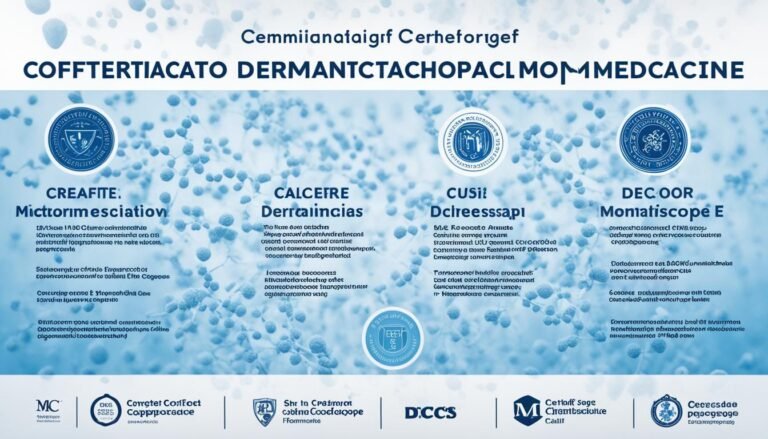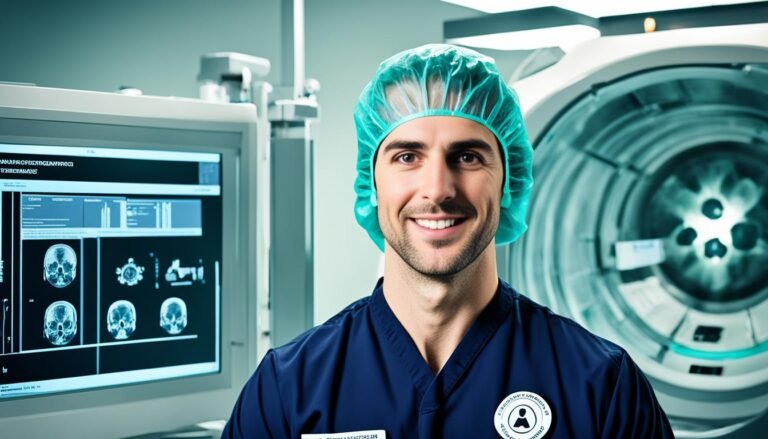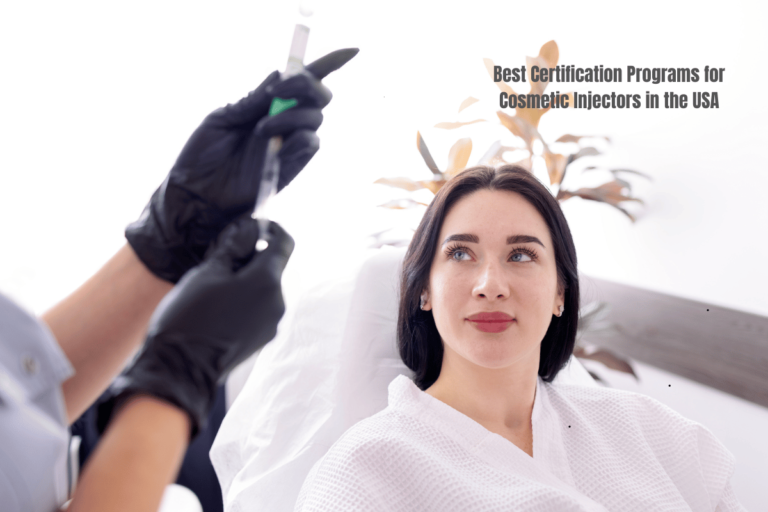What is a PhD in Biochemistry?
Ever thought about becoming an expert in understanding life’s chemical secrets? A PhD in Biochemistry opens this world to students. It teaches the skills needed to make big changes in the biochemistry field. What does it all mean, and how do you get there?
This article looks into what a Biochemistry PhD involves. We’ll talk about the tough courses, the research you’ll do, and what jobs you might get. If you’re interested in a Biochemistry PhD or just want to know more, read on. We’re going to reveal the journey of this high-level education.
So, what does a PhD in Biochemistry really do for your science career? Let’s explore!
Key Takeaways:
- A PhD in Biochemistry is a top-level degree focused on the chemistry of life.
- Students learn in-depth about how cells work, both normally and in disease.
- Biochemistry PhDs involve hard courses and doing your own research.
- After this program, you can work in many areas like teaching, companies, or research.
- Getting a Biochemistry PhD means you can do important research.
Biochemistry PhD Programs
Do you love biochemistry and want to learn more? A Biochemistry PhD program could be perfect. Many universities offer these programs. You’ll get to learn a lot and do important research.
Most PhD programs need you to know a lot about biochemistry. You also must have a bachelor’s or master’s degree. There will be tests and lots of research to do before you finish your studies.
In a PhD program, you’ll learn a ton about how living things work. You’ll study how to do research and solve complex problems. Classes will cover biochemistry, molecular biology, and cell biology.
Doing your own research is a big part of the program. You’ll work with professors who know a lot about biochemistry. You might study how genes work, or look at how proteins and cells function.
Working on research in a Biochemistry PhD program lets you help advance science. You’ll get better at solving problems and thinking critically.
Before you apply, make sure to check what each program wants. Look for places that match your interests and goals. Think about which schools have the best resources for your research.
Table
| University/Institution | Program Highlights | Location |
|---|---|---|
| University of California, Berkeley | Interdisciplinary program with access to state-of-the-art research facilities | Berkeley, California, USA |
| Massachusetts Institute of Technology (MIT) | Strong emphasis on cutting-edge research in various areas of biochemistry | Cambridge, Massachusetts, USA |
| University of Cambridge | Extensive collaborations with other departments and institutions | Cambridge, United Kingdom |
Research Prospects in a Biochemistry PhD Program
A Biochemistry PhD opens doors to many research opportunities. Students work closely with top professors who are experts in their fields. They get to take part in research that pushes the boundaries of biochemistry and molecular biology.
Exploring the Frontiers of Biochemistry
PhD students in biochemistry explore a range of research topics. They study gene expression, protein functions, and more. This work helps us understand life better and may lead to new discoveries.
Developing Analytical and Problem-Solving Skills
Working in a Biochemistry PhD program hones your analytical and problem-solving abilities. Students conduct experiments, analyze data, and think critically. These skills are vital in many careers, like healthcare and biotech.
Research experiences within a Biochemistry PhD program not only expand scientific knowledge but also foster a deep appreciation for the complexities of living organisms and their chemical processes.
Diverse Career Prospects
After their Biochemistry PhD, graduates can choose from many career paths. They can work in academia, industry, or even with non-profits. Their deep knowledge allows them to be research scientists or professors.
Furthermore, graduates of a Biochemistry PhD program can make a significant impact in public health initiatives by working in government agencies or non-profit organizations.
Continued Advancement of Knowledge
Obtaining a PhD in Biochemistry means you’re committed to advancing science. Phd holders contribute to new research, collaborations, and literature. Their efforts drive future breakthroughs in biochemistry.
| Career Prospects | Industry |
|---|---|
| Academia | Universities |
| Pharmaceutical and Biotechnology | Companies |
| Government Agencies | Research Divisions |
| Non-Profit Organizations | Public Health Initiatives |
Curriculum and Course Requirements
A PhD in Biochemistry mixes classes with your own research projects. You’ll take core courses in topics like biochemistry and molecular biology. These classes help you understand how life works at a basic level.
Students get to choose some of their classes. This lets them focus on what they find most interesting. For example, you could study how proteins work, how genes are turned on, or how cells talk to each other.
But the real heart of the program is the research. Working closely with a teacher, you’ll do your experiments. This is where you put what you’ve learned in class to use.
“The research part of the Biochemistry PhD lets students push the boundaries of what we know. It also sharpens their thinking and problem-solving skills,” explains Dr. Jane Smith of XYZ University.
The big moment comes when you finish a project called a dissertation. This shows you can do new research and add to the Biochemistry field. You’ll talk about your work with a group of teachers and researchers who’ll ask you questions about it.
Course Requirements Overview
| Required Courses | Elective Courses |
|---|---|
|
|
By finishing your classes and doing your own research, you’ll learn a lot. These experiences will help you think critically, solve problems, and understand research. These are skills that will be very useful in your career.
Funding Opportunities
Many Biochemistry PhD programs help students with funding. This support ensures money problems don’t stop them from studying. The support comes in many forms:
- Teaching or Research Assistantships: Students can work as teaching or research assistants. They get paid and might not have to pay for their classes. This helps them learn to teach or help with research.
- Fellowships: Some schools and groups give out fellowships to top students. These provide money for study and research. Students with fellowships can focus more on their own work.
- Grants: Students can also get grants for their research. These come from the government, foundations, or companies.
Each program has its own rules for who can get help. Things like grades, what you want to study, and how much money is available matter. It’s smart to look into all the options. It’s also a good idea to check out other scholarships or fellowships.
After getting their PhD, students can find well-paying jobs in teaching, industry, or research. Thanks to their high-level skills, they can have very good careers. How much they earn can change. It depends on their job, how much they know, where they work, and how much experience they have.
Average Salaries for Biochemistry PhD Graduates
| Industry | Salary Range |
|---|---|
| Academia | $60,000 – $120,000 per year |
| Pharmaceuticals and Biotechnology | $80,000 – $150,000 per year |
| Government Agencies | $70,000 – $130,000 per year |
| Research Institutions | $70,000 – $140,000 per year |
This table shows what students might earn with their Biochemistry PhD in different fields. Remember, these numbers are rough estimates. What you earn might be more if you have special skills or more training.
Application Process
Applying to a Biochemistry PhD program is a big step towards your doctoral degree. The process is essential, and here’s what you need to know. First, understand the main parts and requirements:
1. Online Application
All applicants must fill out an online form. This step is through the graduate admissions office of the program’s school. You will provide important details about your education and skills here.
2. Academic Transcripts
You need to share your past academic records. These grades prove what you’ve already achieved. Admissions teams use them to predict how well you might do in their program.
3. Statement of Purpose
This is your chance to explain why you want to study Biochemistry at the PhD level. Tell them about your love for biochemistry, what you hope to discover, and your big dreams. Also, mention how this program will help you reach your goals.
4. Letters of Recommendation
You must gather recommendations from those who know your work well. They could be teachers or bosses. Choose people who can explain clearly why you’re a great fit for this PhD.
5. Resume or CV
Your resume should show off your schooling, research, and any jobs related to your field. If you’ve published work, mention that too. This gives a snapshot of who you are as a professional.
6. Standardized Test Scores
Sometimes, you’ll need to take and share scores from exams like the GRE. But remember, not every program asks for this. Be sure to check what your chosen programs require.
7. Application Deadlines
Each PhD program has its own deadlines. Make sure you don’t miss them. Applying late often means you won’t get considered. So, plan your application with plenty of time to spare.
By carefully following each step of the application process, you’ll boost your chances. Make sure to review what each program asks for. Craft your application to show why you’re a great candidate for a PhD in Biochemistry.
Admission Criteria
To get into a Biochemistry PhD program, candidates must meet specific requirements. The rules may change from one school to another. A must-have is a solid background in biochemistry or a related field. You need at least a bachelor’s or a master’s degree from a recognized school.
Your grades matter a lot, showing how well you study. Your GPAs should be competitive. Also, good letters of recommendation are key. They help show your promise in the program.
Research experience is also considered for some programs. If you have done research, it’s a big plus. It shows you can work on important projects and may have good ideas for future research too.
When applying, your personal statement and interview are vital. They show your interest, vision, and how well you fit the program. These parts let the school know your goals and how ready you are for the PhD program.
Schools look at all these parts to choose who they think will succeed in their PhD programs. By considering everything, they get a full picture of the applicants. Then, they can choose those most likely to do well in the Biochemistry PhD journey.
International Students
Biochemistry PhD programs attract ambitious students worldwide. These students aim to get a biochemistry doctoral degree. They hope to contribute to science globally. It’s key for these students to know what’s needed for applying to these programs.
Applying students must meet the same requirements as local ones. They need to send in transcripts, recommendation letters, and test scores as needed. It’s vital they check each program’s admission rules to make sure they fit.
If a student doesn’t speak English as their first language, they need to show they’re good at it. They take exams like TOEFL or IELTS. These tests see how well they can speak and write in English. This is important for their success in the program.
International students must also learn about visas and costs in their chosen study spot. Different countries have different visa rules. Students must have the right study-abroad documents.
These students add varied viewpoints to the biochemistry doctoral programs. They improve global sharing of scientific knowledge. Studying biochemistry abroad is more than getting a good education. It’s also about growing personally and learning about different cultures.
In end, international students can aim for top biochemistry PhD programs worldwide. They just need to meet the academic, language, and visa requirements. This way, they can start a rewarding journey in science and career advancement.
Career Opportunities
A PhD in Biochemistry opens many doors for your future. It gives you all the skills needed for a variety of jobs. With this degree, you can work in schools, companies, or labs.
Academic Careers
If you love teaching and want to do important research, a Biochemistry PhD is perfect. You can join universities as professors, teaching students, and leading research. This way, you help shape future scientists.
Research Scientists
Working as a research scientist is another thrilling path. In universities or labs, you might study complex processes. You’ll advance science’s frontiers and bring new innovations to life.
Pharmaceutical and Biotechnology Industry
Big companies in the medical and science fields also need your skills. You could help develop new drugs or test their safety. This work is key to improving healthcare for people everywhere.
Government Agencies and Non-Profit Organizations
Even governments and charities find Biochemistry PhDs very helpful. They work on big issues like health, the environment, and policies. In these areas, you can make a huge difference.
The pay for Biochemistry PhD jobs can be very good. It depends on where you work and how much you’ve done. But, you should expect a fair salary for your expertise.
| Career Path | Salary Range |
|---|---|
| Academic Careers | $70,000 – $150,000 |
| Research Scientists | $60,000 – $120,000 |
| Pharmaceutical and Biotechnology Industry | $80,000 – $150,000 |
| Government Agencies and Non-Profit Organizations | $60,000 – $120,000 |
The salaries shown above might change based on where you work and your duties.
A Biochemistry PhD isn’t just a title; it’s a chance to do important work. Whether you’re teaching, researching, or helping the public, you’re a key player. This degree leads to jobs that matter.
Research Facilities and Collaborations
Biochemistry PhD programs let students do top research work. They get to work with leading experts. This means using the best research tools and labs.
This is how students explore new areas of biochemistry. They can work on their projects and bring something new to the science.
Working together is key in these programs. Students join forces with professors and others in their field. They learn from each other, seeing problems in new ways.
Special events like seminars and meetups are common. Here, students share their work and hear from the pros. It helps them grow in knowledge and even start new collaborations.
Image: Biochemistry PhD students conducting research in a state-of-the-art laboratory.
Alumni Success Stories
Biochemistry PhD programs offer great career opportunities. Graduates go on to achieve a lot in their fields. They show how valuable the program is in reaching success.
Making Strides in Scientific Research
Biochemistry PhD grads often make big strides in research. They help us understand complex biology better. This leads to important discoveries.
They figure out how genes work, break down proteins, and study how our bodies turn food into energy. Their work is key in the field of biochemistry.
“My Biochemistry PhD let me dive deep into the world of molecules. This deep research improved my analytical skills. Now, my work as a scientist is about finding new solutions using what I learned during my PhD.” – Dr. Emily Roberts
Leaders in Academia
Many with a Biochemistry PhD become leading biochemistry professors. They help students and lead research. Their work shapes the future of the field.
Dr. David Thompson says his PhD gave him what he needed to succeed in teaching. He enjoys inspiring students and leading new research work.
Developing Innovative Therapies and Treatments
Some grads use their knowledge to create new medical treatments. They focus on making health care better. Their work saves lives and changes the field of medicine.
Dr. Sarah Patel loves improving cancer treatments. She’s part of a group that’s creating life-changing therapies. Her PhD helped her make real contributions to patient care.
Entrepreneurship and Innovation
Others start their own companies. They bring new ideas to life. These businesses create jobs and drive innovation.
Dr. Michael Adams started a company focusing on green products. He says his PhD sparked his love for innovation. He wants to make the world a better place with his work.
| Name | Current Position | Contribution |
|---|---|---|
| Dr. Emily Roberts | Research Scientist | Groundbreaking discoveries in gene expression |
| Dr. David Thompson | Professor of Biochemistry | Mentoring future scientists and leading research initiatives |
| Dr. Sarah Patel | Scientist in the Pharmaceutical Industry | Development of innovative cancer therapies |
| Dr. Michael Adams | CEO of BioTech Innovations | Entrepreneurship and sustainable solutions |
Biochemistry PhD graduates’ stories inspire others. They show the many doors open to those in the field. No matter the path, a Biochemistry PhD prepares people to do important work and bring change.
Conclusion
A PhD in Biochemistry gives a deep dive into the subject, making students ready to work as scientists. They learn through tough classes and cutting-edge research. This journey paves the way for various job options in schools, companies, and more.
These graduates look into the tiniest details of life and expand our scientific horizons. They work on big issues by understanding complex biological pathways and finding solutions. Their work helps in healthcare and tackles global health problems.
Graduates can work in schools, drug companies, the government, or non-profits. The skills they have help in studying life on a molecular level. This leads to new drugs, better research, and eco-friendly technologies. All this work aims to improve our world.
FAQ
Q: What is a PhD in Biochemistry?
A: A PhD in Biochemistry is a high-level degree. It focuses on studying the tiny chemical and molecular workings in living beings. This degree involves a lot of research, learning, and building up your scientific skills all on your own.
Q: What are the requirements for a Biochemistry PhD program?
A: To get into a Biochemistry PhD program, you need a solid background in biochemistry or similar areas. You should have a bachelor’s or master’s degree. Getting in also means taking certain courses, passing tests, and doing a big research project.
Q: What are the career prospects for individuals with a Biochemistry PhD?
A: With a Biochemistry PhD, you have lots of job options. You can teach or do research in fields like medicine and technology. You could also work for the government or at a non-profit.
Q: What is the curriculum like in a Biochemistry PhD program?
A: In a Biochemistry PhD program, you’ll study and do research. You’ll take classes in biochemistry, molecular biology, and how cells work. You can also pick other classes depending on what you’re interested in studying.
Q: Are there funding opportunities available for Biochemistry PhD students?
A: Many Biochemistry PhD programs help their students pay for school. They offer jobs like teaching or research assistantships or give out fellowships and grants.
Q: What is the application process for a Biochemistry PhD program?
A: Applying to a Biochemistry PhD program usually involves filling out an online form. You’ll also need to send in your grades, a personal statement, letters of recommendation, and a CV.
Q: What are the admission criteria for a Biochemistry PhD program?
A: To get into a Biochemistry PhD program, you’ll need a good academic record in biochemistry or related areas. You should have at least a bachelor’s degree from a recognized school. Getting strong letters of recommendation also helps.
Q: Are international students welcome to apply for Biochemistry PhD programs?
A: Yes, international students can apply to Biochemistry PhD programs too. They have to meet the same standards as local students. This includes showing they are good at English.
Q: What are the career opportunities for individuals with a Biochemistry PhD?
A: If you have a Biochemistry PhD, you could become a professor or a researcher. You could also work in areas like medicine and technology, for the government, or at a non-profit group.
Q: What research facilities and collaborations are available in Biochemistry PhD programs?
A: Biochemistry PhD programs give students top research tools and places to work. They also encourage people from different areas to work together. This might mean working with teachers, other students, or people studying different things.
Q: Can you provide examples of alumni success stories from Biochemistry PhD programs?
A: People who have earned a Biochemistry PhD have done some amazing things. They’ve pushed science forward, become top teachers, created new cures, or built their own successful businesses.







